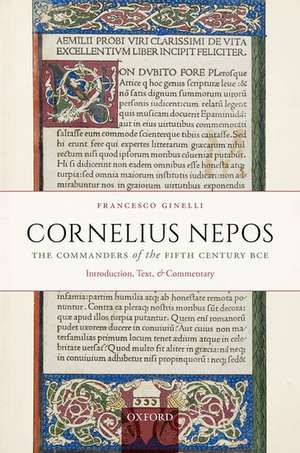Cornelius Nepos, The Commanders of the Fifth Century BCE: Introduction, Text, and Commentary
Autor Francesco Ginellien Limba Engleză Hardback – 25 noi 2021
Preț: 996.31 lei
Preț vechi: 1422.26 lei
-30% Nou
Puncte Express: 1494
Preț estimativ în valută:
190.64€ • 199.76$ • 157.60£
190.64€ • 199.76$ • 157.60£
Carte disponibilă
Livrare economică 10-17 martie
Preluare comenzi: 021 569.72.76
Specificații
ISBN-13: 9780198836131
ISBN-10: 0198836139
Pagini: 356
Dimensiuni: 164 x 240 x 29 mm
Greutate: 0.71 kg
Editura: OUP OXFORD
Colecția OUP Oxford
Locul publicării:Oxford, United Kingdom
ISBN-10: 0198836139
Pagini: 356
Dimensiuni: 164 x 240 x 29 mm
Greutate: 0.71 kg
Editura: OUP OXFORD
Colecția OUP Oxford
Locul publicării:Oxford, United Kingdom
Recenzii
The author is to be commended for the skillful work that is in evidence throughout, and the press for undertaking a major project on an author who has rarely received his due. This is a marvelously rendered, well proofread, very much needed resource that joins the ranks of standard commentaries on Latin prose authors.
It pays dividends in a fuller understanding of the triumphs and tragedies of 5th century Greece. A very fine example of classical scholarship, this will be of great help to those interested in understanding how Greece became the crucible of democracy.
It offers sufficient detail on the topographical, military, and historical issues raised in the text to make it a very useful tool for specialists and the wider audience alike.
It pays dividends in a fuller understanding of the triumphs and tragedies of 5th century Greece. A very fine example of classical scholarship, this will be of great help to those interested in understanding how Greece became the crucible of democracy.
It offers sufficient detail on the topographical, military, and historical issues raised in the text to make it a very useful tool for specialists and the wider audience alike.
Notă biografică
Francesco Ginelli received his PhD in Literature and Philology from the University of Verona and is a postdoctoral researcher at the University of Milan.
